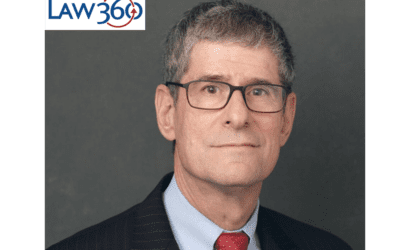DeBofsky Law recently received a ruling from Judge Robert Dow, Jr. of the U.S. District Court for the Northern District of Illinois in Harding v. Hartford Life and Accident Insurance Company, 2017 WL 1316264 (N.D. Ill. April 10, 2017), which thoughtfully analyzed the scope of available discovery in an ERISA action adjudicated under the de novo standard of judicial review. The case involved a bank employee who became disabled 2011 due to multiple musculoskeletal and autoimmune conditions. Although Harding’s ensuing claims for long-term disability benefits and a life insurance premium waiver on account of disability under her employer’s group disability insurance plan was approved for a period of time, Hartford terminated both benefits in 2014 and upheld its decision after a pre-suit appeal was submitted. Plaintiff then brought suit against Hartford.
The issue came before the court when plaintiff requested leave to take two depositions – Dr. Julia Ash, a medical consultant whose opinion based on a record review was instrumental in the claim denial, and Mary Roman, a claim manager who upheld Hartford’s determination on appeal.The court allowed Dr. Ash’s deposition, but denied Harding’s request to take Roman’s deposition.
The court cited several prior rulings that recognized the potential biases and conflicts of interest that may have influenced the consultant’s report and concluded that the plaintiff should have the opportunity to seek discovery regarding those opinions and to discredit them if the doctor’s opinions. (citing Borich v. Life Ins. Co. of N. Am., 2013 WL 1788478, at *5 (N.D. Ill. Apr. 25, 2013); Grant v. Standard Ins. Co., 2013 WL 2434698, at *1 (N.D. Ill. June 4, 2013); Gavin v. Life Ins. Co. of N. Am., 2013 WL 2242230, at *2 (N.D. Ill. May 21, 2013); and Yasko v. Reliance Standard Life Ins. Co., 2012 WL 4797795, at *2 (N.D. Ill. Oct. 9, 2012)).
The court rejected the defendant’s arguments as to why discovery was unwarranted. Most of them arguments focused on the completeness of the claim record, but the court noted its skepticism as to whether the record revealed Dr. Ash’s potential biases and conflicts. The court also overruled the defendant’s claim that the deposition of Dr. Ash would allow the plaintiff to “sandbag” the defendant with new evidence since no explanation was offered as to how that would occur. The defendant also undercut its claim that the deposition would be burdensome and unduly costly by requesting to take four depositions of its own, with the court finding, “It is hard to see how the cost of taking Dr. Ash’s deposition is unreasonable, but incurring the same costs to take five depositions is reasonable.” Thus, the doctor’s deposition was allowed.
Nonetheless, the court disallowed Ms. Roman’s deposition based on its conclusion that her qualifications, her purported biases, and her decision making process are simply irrelevant under a de novo review because this Court must make an ‘independent decision’ regarding Plaintiff’s eligibility for benefits. [citation omitted]. Said differently, “[w]hat happened before the Plan administrator or ERISA fiduciary is irrelevant.” Diaz v. Prudential Ins. Co. of Am., 499 F.3d 640, 643 (7th Cir. 2007). The Court will not defer to or rely on Ms. Roman’s decision to deny Plaintiff’s appeal, which means questions about her biases or if she applied the correct standard to review Plaintiff’s claim “ha[ve] no probative value whatsoever.” [citation omitted].
The court determined that the claim adjuster’s bias is simply irrelevant under de novo review.The court also rejected the plaintiff’s argument that because she may need to prove culpability in making a claim for fees if she succeeded in the litigation because no other court had permitted discovery on that basis, and the court deemed Roman’s culpability “speculative.”
The court also barred the Defendant from seeking discovery, although it allowed the request to be renewed following Dr. Ash’s deposition if testimony elicited in that deposition would require additional discovery from the plaintiff or her treating doctors.
Discussion: This ruling is an excellent synthesis of the rationale permitting discovery from consultants retained by benefit plans. However, the same arguments would seem to logically apply to discovery from the claim adjusters. If the adjuster had been instructed to deny nine out of every ten appeals or to disallow claims exceeding a certain financial value, that is an important factor for the court to know. Ultimately, while courts performing a de novo assessment of the evidence in a claim such as this will be called upon to weigh the evidence just as Ms. Roman did here, judges are not medical and vocational experts. If judges were aware that there was an unseen thumb on the scale that led to the benefit denial, it would influence their assessment of the “evidence” supporting the claim determination. At the very least, it is information that a court ought to know in evaluating the merits of a claim.
DeBofsky Law recently received a ruling from Judge Robert Dow, Jr. of the U.S. District Court for the Northern District of Illinois in Harding v. Hartford Life and Accident Insurance Company, 2017 WL 1316264 (N.D. Ill. April 10, 2017), which thoughtfully analyzed the scope of available discovery in an ERISA action adjudicated under the de novo standard of judicial review. The case involved a bank employee who became disabled 2011 due to multiple musculoskeletal and autoimmune conditions. Although Harding’s ensuing claims for long-term disability benefits and a life insurance premium waiver on account of disability under her employer’s group disability insurance plan was approved for a period of time, Hartford terminated both benefits in 2014 and upheld its decision after a pre-suit appeal was submitted. Plaintiff then brought suit against Hartford.
Discussion: This ruling is an excellent synthesis of the rationale permitting discovery from consultants retained by benefit plans. However, the same arguments would seem to logically apply to discovery from the claim adjusters. If the adjuster had been instructed to deny nine out of every ten appeals or to disallow claims exceeding a certain financial value, that is an important factor for the court to know. Ultimately, while courts performing a de novo assessment of the evidence in a claim such as this will be called upon to weigh the evidence just as Ms. Roman did here, judges are not medical and vocational experts. If judges were aware that there was an unseen thumb on the scale that led to the benefit denial, it would influence their assessment of the “evidence” supporting the claim determination. At the very least, it is information that a court ought to know in evaluating the merits of a claim.






